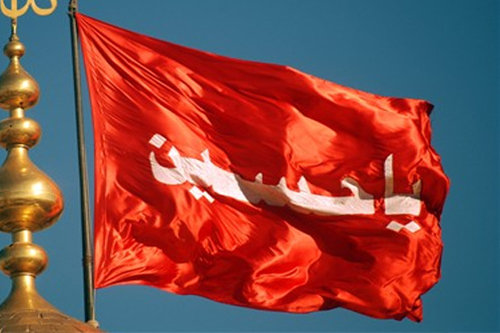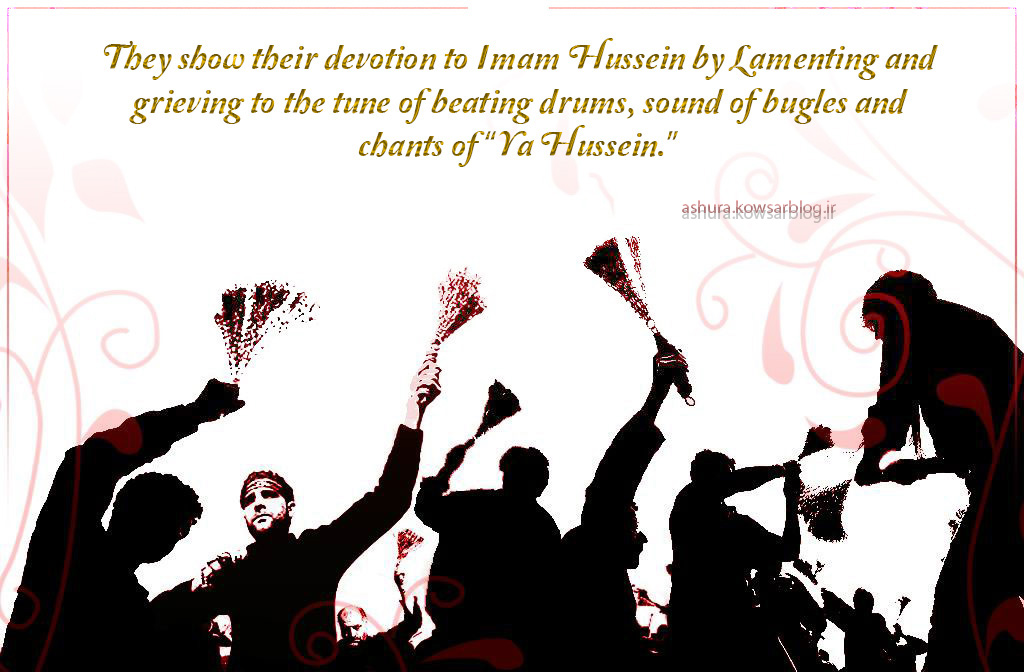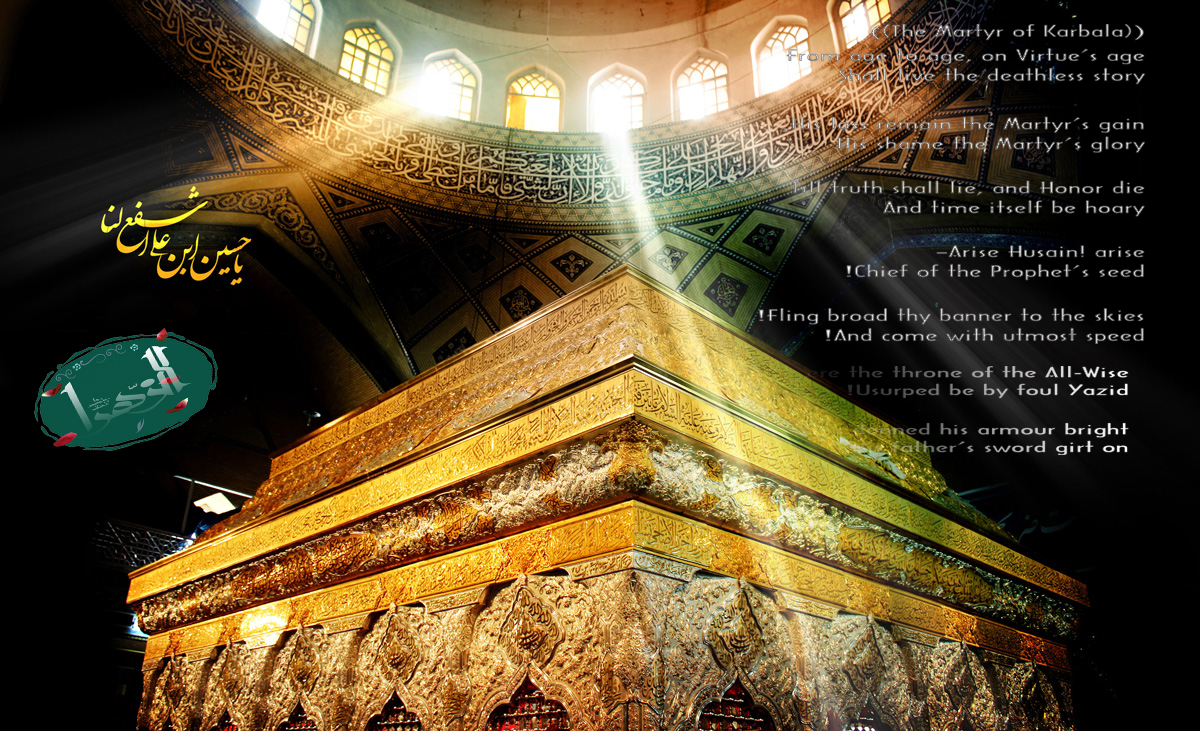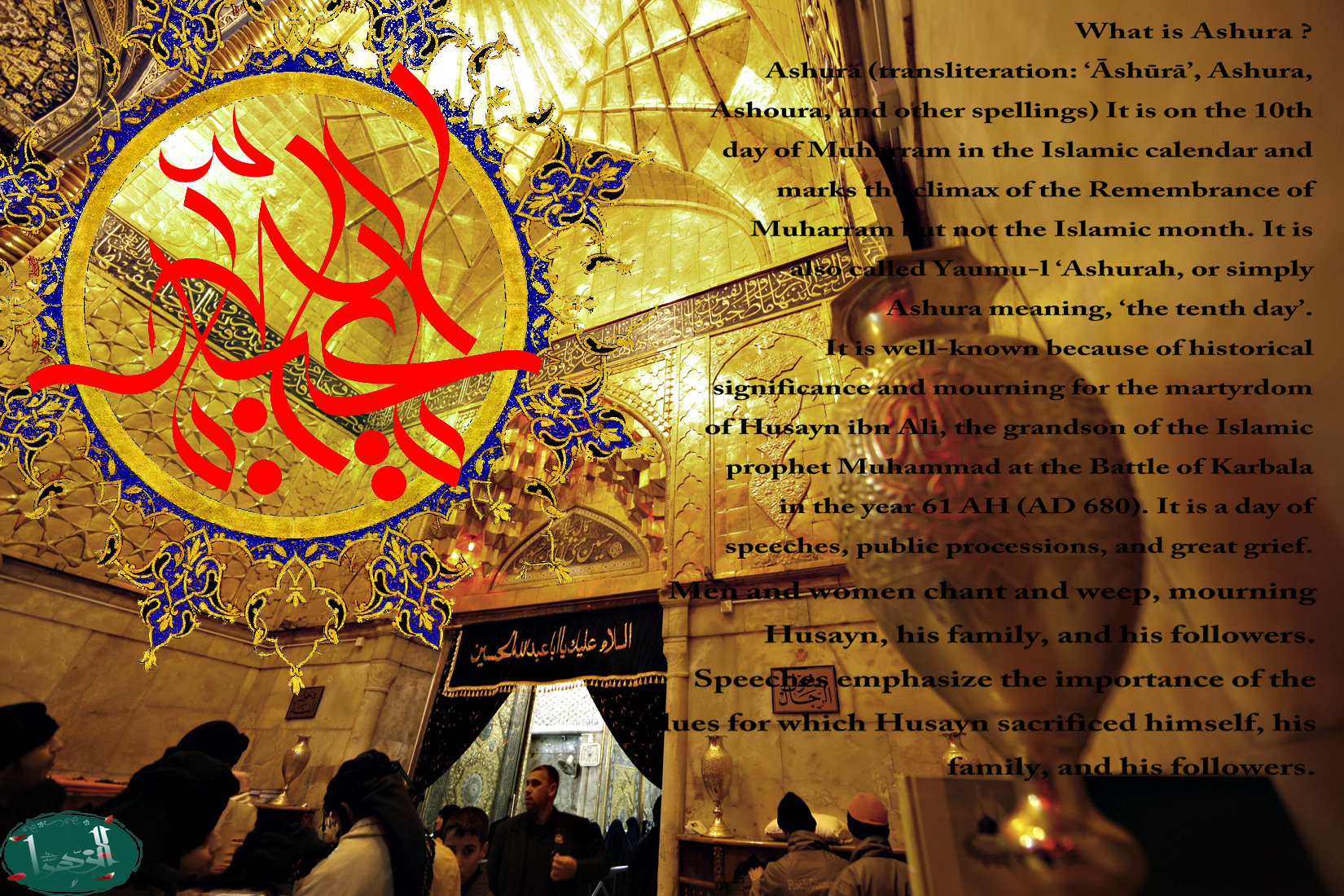فبک للحسین
 آقا که بخواهد روزی دهد صبح که چشم باز میکنی به قلب و زبانت جاری میشود که بکم فتح الله و بکم یختم. آنوقت است که اگر فکر کنی میبینی برای روز اول تولدت آقا امر کرده بهش تربت امام حسین علیه السلام بخورانید و آخر که از دنیا میروی هم. دست آخر هم میفرمایند: در هر مصیبت و محنی فبک للحسین(ع) اول و آخر دنیای من! یا ابا عبد الله!
آقا که بخواهد روزی دهد صبح که چشم باز میکنی به قلب و زبانت جاری میشود که بکم فتح الله و بکم یختم. آنوقت است که اگر فکر کنی میبینی برای روز اول تولدت آقا امر کرده بهش تربت امام حسین علیه السلام بخورانید و آخر که از دنیا میروی هم. دست آخر هم میفرمایند: در هر مصیبت و محنی فبک للحسین(ع) اول و آخر دنیای من! یا ابا عبد الله!
the highest mountain

Ayatollah Khamenei
“There is a crucial point in Imam Hussein’s (Peace Be upon Him) lifetime which impacts upon all the historical events just like the highest mountain looming up in front of us and that is nothing but Ashura!”
(26th January 1992)
Imam Hussain’s Virtues

Imam Hussain’s Virtues
The Messenger of Allah (S) stated, “Hussain is from me and I am from Hussain. Everyone who likes Hussain is loved by Allah. Hussain is a sibt (son of daughter) of my sibts.”
Prophet Muhammad (S) also said, “Everyone who wants to see the most beloved person in the heavens and the earth should look at Hussain.”
Hadhifah has narrated from the Messenger of Allah (S), “Allah has granted Hussain a virtue that He has given to no one, except to Joseph, son of Jacob.”
Hadhifat Ibn Yaman says, “I saw the Messenger of Allah (S) holding Hussain’s hand and saying, ‘O people! This is Hussain Ibn Ali. Know him! By Allah that he will be in the Paradise, along with his friends and the friends of his friends.’ He then continued, ‘Hasan and Hussain are the best people on the earth, after their father and I, and their mother is the best woman in the world.’”
Prophet Muhammad (S) said, “Hasan and Hussain are my two flowers on the earth.”
The Prophet (S) stated, “Hasan and Hussain are masters of the youth of the Paradise and their father is more virtuous than them.”
Imam Hussains Virtues

Imam Hussains Virtues
Birth and Martyrdom
Imam Hussain (a.s.) was born on the third or fifth of Sha’ban in the fourth year A.H. in Medina. His father was Ali Ibn Abi Talib (a.s.) and his mother was Fatimah (s.a.), Prophet Muhammad (S)’s daughter. His nickname was Abu ‘Abdullah and his most famous titles were Tayyib, Sayyid, Sibt, Wafi, and Mubarak.
At his birth time, Gabriel was revealed to the Messenger of Allah (S) for congratulating and brought Allah’s message to the Prophet (S) to name the infant Hussain. The Messenger of Allah (S) recited ‘adhan in his right ear and ‘iqamah in his left ear. On the seventh day after Imam Hussain’s (a.s.) birth, two sheep were sacrificed for him and the meat was divided among the poor.
Imam Hussain (a.s.) lived fifty six years and some days, according to some narrations. He lived six years and several months with Prophet Muhammad (S) before the Prophet (S)’s demise, thirty years with his father, ten years with his brother Imam Hasan (a.s.) after his father’s demise, and ten years after his brother’s demise. He was martyred on the day of ‘ashura (tenth of Muharram) in the year sixty one A.H. in Karbala and his holy body was buried in that land.[1]
Imam Hussein is the symbol of morality

It is usually thought that Islam views God as a heartless Ruler of the world, an angry Judge, and a wrathful Lord who is looking meticulously for a wrongdoer to punish them. For those who have thoughtfully read the Quran only once in their lifetime it is very easy to discard this view beyond any doubt.
However, for those who have not carefully read the Quran, or do not have the necessary means and knowledge to analyse its verses, there stands, in the living memory of the history, an episode which, very clearly, epitomizes the notion of love between the creator and the created, and the sacrifice and suffering that could be endured readily and contentedly by a human being for the sake of the beloved God.
This episode is the event in which Hussain, the grandson of the Prophet of Islam, offered not only his soul and his flesh to the Lord, but that of his sons, his nephews his cousins and his closest friends, and bore the grief of the foreseeable capture of his wife, his daughters and his sisters. This happened on the 10th day of Muharram in a land called Karbala in the year 682 AD.
As the grandson of the Prophet and someone who was very much adored by him, Hussain could have lived a very comfortable and well-heeled life after his grandfather, much honoured and revered by his contemporaries. However, he was devoted to the cause of the Lord, concerned about the guidance that was revealed to his grandfather and eager to make sure that the path of love towards God was not obstructed by voracious, materialistic type of people who had joined Islam only to fulfil their mean and meagre worldly ambitions.
And he did well. On one single day he demonstrated a degree of love and sacrifice towards the Lord that could hardly be paralleled by any similar incident in the history of mankind. He loudly cried his dissatisfaction of what was going on in the name of the Lord and with recourse to the authority of his grandfather; a cry that can be heard even today through the long stretched tunnel of history.
Hussain used to say in his supplications:
“My Lord! You are the One who removes all others from the heart of those whom You love, in a manner that they do not love but You, and do not seek refuge from anyone but from you; You are their intimate company when the trials of the world frightens them. My Lord! Those who have lost You, what do they find, and those who have found You, what do they lose?”
Hussain had nothing to loose since he had found a Love that gives life to everything.